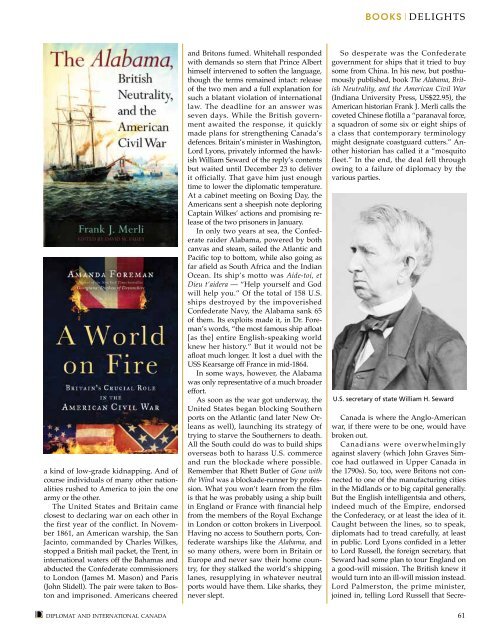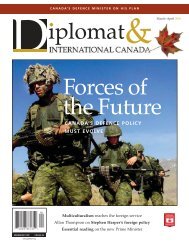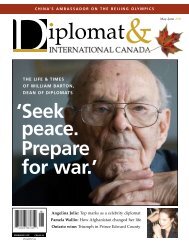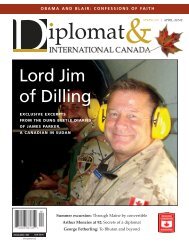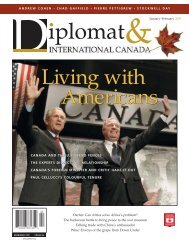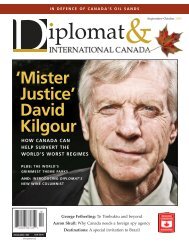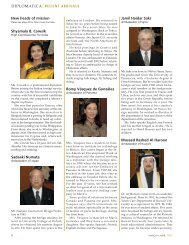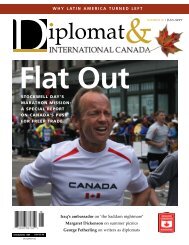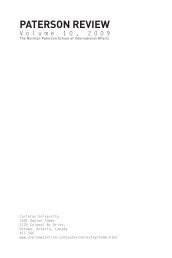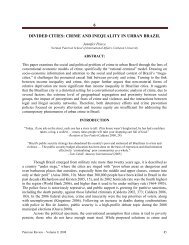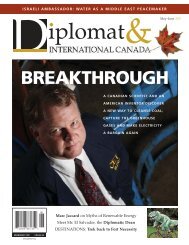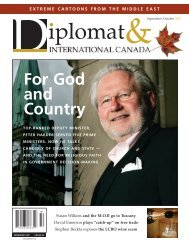John Baird: Canada's freedom agenda - Diplomat Magazine
John Baird: Canada's freedom agenda - Diplomat Magazine
John Baird: Canada's freedom agenda - Diplomat Magazine
You also want an ePaper? Increase the reach of your titles
YUMPU automatically turns print PDFs into web optimized ePapers that Google loves.
BOOKS|DELIGHTSa kind of low-grade kidnapping. And ofcourse individuals of many other nationalitiesrushed to America to join the onearmy or the other.The United States and Britain cameclosest to declaring war on each other inthe first year of the conflict. In November1861, an American warship, the SanJacinto, commanded by Charles Wilkes,stopped a British mail packet, the Trent, ininternational waters off the Bahamas andabducted the Confederate commissionersto London (James M. Mason) and Paris(<strong>John</strong> Slidell). The pair were taken to Bostonand imprisoned. Americans cheeredand Britons fumed. Whitehall respondedwith demands so stern that Prince Alberthimself intervened to soften the language,though the terms remained intact: releaseof the two men and a full explanation forsuch a blatant violation of internationallaw. The deadline for an answer wasseven days. While the British governmentawaited the response, it quicklymade plans for strengthening Canada’sdefences. Britain’s minister in Washington,Lord Lyons, privately informed the hawkishWilliam Seward of the reply’s contentsbut waited until December 23 to deliverit officially. That gave him just enoughtime to lower the diplomatic temperature.At a cabinet meeting on Boxing Day, theAmericans sent a sheepish note deploringCaptain Wilkes’ actions and promising releaseof the two prisoners in January.In only two years at sea, the Confederateraider Alabama, powered by bothcanvas and steam, sailed the Atlantic andPacific top to bottom, while also going asfar afield as South Africa and the IndianOcean. Its ship’s motto was Aide-toi, etDieu t’aidera — “Help yourself and Godwill help you.” Of the total of 158 U.S.ships destroyed by the impoverishedConfederate Navy, the Alabama sank 65of them. Its exploits made it, in Dr. Foreman’swords, “the most famous ship afloat[as the] entire English-speaking worldknew her history.” But it would not beafloat much longer. It lost a duel with theUSS Kearsarge off France in mid-1864.In some ways, however, the Alabamawas only representative of a much broadereffort.As soon as the war got underway, theUnited States began blocking Southernports on the Atlantic (and later New Orleansas well), launching its strategy oftrying to starve the Southerners to death.All the South could do was to build shipsoverseas both to harass U.S. commerceand run the blockade where possible.Remember that Rhett Butler of Gone withthe Wind was a blockade-runner by profession.What you won’t learn from the filmis that he was probably using a ship builtin England or France with financial helpfrom the members of the Royal Exchangein London or cotton brokers in Liverpool.Having no access to Southern ports, Confederatewarships like the Alabama, andso many others, were born in Britain orEurope and never saw their home country,for they stalked the world’s shippinglanes, resupplying in whatever neutralports would have them. Like sharks, theynever slept.So desperate was the Confederategovernment for ships that it tried to buysome from China. In his new, but posthumouslypublished, book The Alabama, BritishNeutrality, and the American Civil War(Indiana University Press, US$22.95), theAmerican historian Frank J. Merli calls thecoveted Chinese flotilla a “paranaval force,a squadron of some six or eight ships ofa class that contemporary terminologymight designate coastguard cutters.” Anotherhistorian has called it a “mosquitofleet.” In the end, the deal fell throughowing to a failure of diplomacy by thevarious parties.U.S. secretary of state William H. SewardCanada is where the Anglo-Americanwar, if there were to be one, would havebroken out.Canadians were overwhelminglyagainst slavery (which <strong>John</strong> Graves Simcoehad outlawed in Upper Canada inthe 1790s). So, too, were Britons not connectedto one of the manufacturing citiesin the Midlands or to big capital generally.But the English intelligentsia and others,indeed much of the Empire, endorsedthe Confederacy, or at least the idea of it.Caught between the lines, so to speak,diplomats had to tread carefully, at leastin public. Lord Lyons confided in a letterto Lord Russell, the foreign secretary, thatSeward had some plan to tour England ona good-will mission. The British knew itwould turn into an ill-will mission instead.Lord Palmerston, the prime minister,joined in, telling Lord Russell that Secre-diplomat and international canada 61


